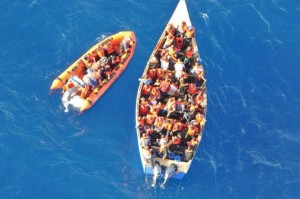
These days news outlets around the world are plastered with images of Southern European countries’ coastguard vessels intercepting rickety dinghies trying to cross the Mediterranean Sea. This practice is one of the most notable instances of what Aristide Zolberg calls ‘remote control’, or the array of policies and practices aimed at managing migratory flows before they reach a country’s territory. The externalization of migration management is not a new phenomenon, and not unique to Europe. The Unites States, after all, ‘invented’ the concept of interdiction in the high seas as way to stem the flow of Haitians, Cubans and other undesired migrants heading to El Norte. Yet there is something new about recent developments, both in terms of breath and scope. More problematically, these policies remain highly controversial, raising various ethical and legal issues for the governments that implement them.
All this raises the question: why are these policies so popular? The typical answer offered, the one favoured by politicians – is that it is a very efficient way to address the challenge of unwanted migration. If migrants cannot be managed after they reach their destination, why not contain them before they get there? These policies have also the great advantage of taking place outside the legal boundaries that constrain liberal democracies, thus relieving receiving countries from potential liabilities. They also allow to shift the burden to countries of origin and transit, which are invested with the sole responsibility (with only limited financial and logistical support) of dealing with unwanted migrants.
It is a very simple and appealing logic. It also seems very rational. In this sense it echoes what economists would call ‘externalization’, the idea that in order to maximize profits a business may off load indirect costs to a third party. Whether this strategy is really effective when applied to the migration realm is, however, debatable. The cost of setting up remote control operations and supporting them with all the latest technological gizmos is ballooning. There is also no easy way to measure success. (More detections on the high sea? Or less?). Certainly, it raises serious issues of fairness. While they do receive some (meagre) compensation, sending and transit countries often do not really have a choice when confronted with their powerful counterparts’ requests. And opposition from various quarters (not just the usual suspects, such as the NGOs galaxy, but also greater sections of the European population) is mounting as well. I wonder, however, if the answer to the question of why these policies are so popular among policy-makers has not much to do with rational calculations, but something more subtle and thus less apparent. After all, economists are not the only ones talking about ‘externalization’. This concept has been famously explored by the father of psychoanalysis, Sigmund Freud. From a Freudian perspective, externalization is an unconscious copying mechanism aimed at soothing the anxieties that engulf our daily lives. This process occurs when we find a target – be it a person or an object – in which we project our own characteristics, often negative ones. This mechanism has an important ‘positive’ function. Without the relief that it offers, we would soon reach a state of chronic neurosis. Its sides effects are equally nasty, however, since it can have deleterious consequences on the subjects of our projections, our relations with them and, more generally, on our public image. The silver lining in this phenomenon is that it is typically temporary and that it can be reversed when our level of anxiety gets under control. Whether this is possible when dealing with cases of collective externalization (that is, when it is not just an individual involved but an entire community) is another story. Envisioning Europe’s remote control saga through a psychoanalytic lens, however, points to the fact that politicians’ fascination with these highly toxic policies has more to do with ‘internal’ reasons than external ones. If Europe really wants to confront its uncomfortable relationship with migration, it might have to start by looking at itself in the mirror.




